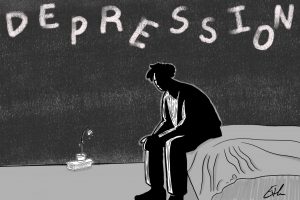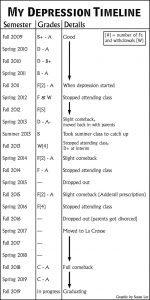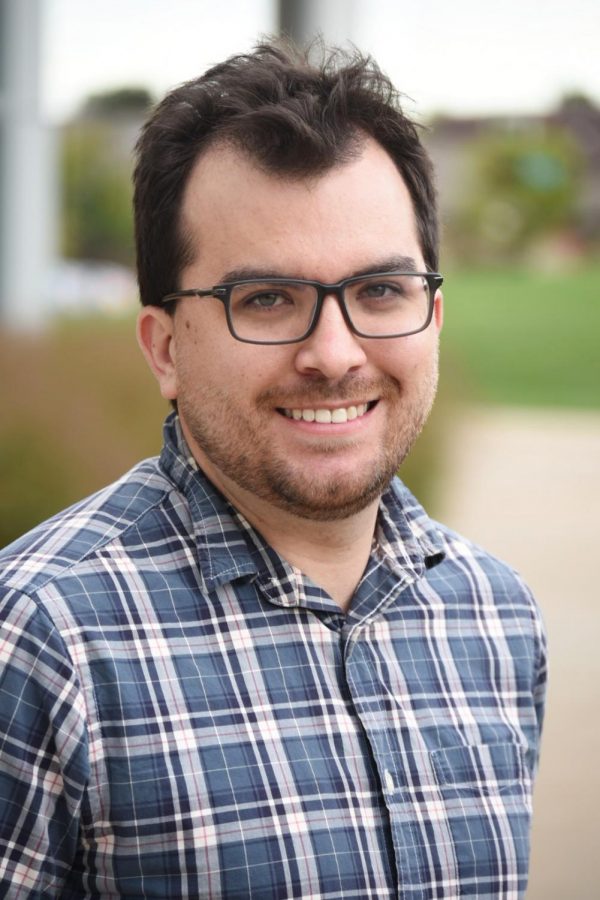Decade of Despair
October 3, 2019
Decade of Despair: Depression caused me to take 10 years to graduate: Learn from me
Since there may be some students who have recently failed their first exam of the semester or have stopped attending classes, I thought this would be the perfect time to share my personal 10-year battle with clinical depression.
During my third year at UWO, something changed within my brain that caused a crippling case of clinical depression. Ten years and 151 credits after I first enrolled, I will finally graduate in December.
I am sharing my story in hopes it will help students going through similar situations. I want them to see they’re not alone and that it is possible to get out of the rut that they are in. If I can get just one student to see themselves in my story and seek out a path of recovery, I’ll consider this effort a success.
Before I begin, I must warn you that my story is not harrowing. Nothing tragic happened to me.
I’ve never been hospitalized for my depression, I never had drug or alcohol problems and I only played around with the idea of suicide once in my head.
You might read this and think it isn’t a traumatic enough experience to share, but the thing about depression is that it feels harrowing when you’re in it. For me, it was enough that it took me an extra six years to graduate.
My timeline of depression involves changing my living situation six times, experiencing eight sexual flings (I never had the confidence to commit to a real relationship) and destroying a series of friendships due to my own self-centeredness.
There are a lot of details to my story, so I’ll try my best to boil it down to the big moments that swayed my emotions one way or another.
Life after high school
When I first enrolled at UWO in 2009, I was young, energetic, optimistic and naive. I was very religious (Catholic) and a big theater nerd. I also lived at home during my freshman year.
I was excited to be in school to study English education and theatre. I wanted so desperately to become a teacher. I had also been invited into the honors program at UWO.
Things were going well, but I had one thing bugging me that didn’t completely go away for about three years: a high school breakup. It seems silly now, but the six-month relationship I had my senior year of high school left a pit in my heart that took way longer to heal than it should have.
This might have been a sign for what came after.
The tipping point
The first signs of my depression started during the fall of 2011 when I realized the English education curriculum was not as exciting or artistic as I imagined it to be.
I began drifting far away from all the things I thought at the time had defined me: teaching, theater, religion — even optimism. Perhaps it was because my brain was still developing, but I became more introverted than extroverted, no longer getting energy from being around others.

By this point I had moved into my own place, so isolating myself in my room for days on end became the optimal thing to do. I stopped attending my “Child & Adolescent Development” class as well as my English class where I had a professor who would scold me for skipping.
I also went through an unfortunate relationship with a woman that made me feel insecure about the way other women perceived me.
The identity crisis I was having was such a shock to me that, after the first few weeks of the next couple semesters, I stopped attending class and stayed in bed all day. I flunked out of both semesters.
However, in the midst of this intense isolation, self-doubt and lack of motivation, I found a silver lining in a new major, journalism, and a new interest: movies.
I had been working at the Advance-Titan selling ads when an editor asked if I could write movie reviews. After getting the opportunity to interview Milwaukee’s own Red Letter Media, a YouTube channel I was a huge fan of, I fell in love with journalism.
However, this newly found passion wasn’t strong enough to keep me attending classes.
At its worst, I went two weeks without going to school or work, only getting out of bed to get something to eat or use the bathroom. No one knew what I was going through.
Ebbs and flows
I began to realize this problem wasn’t going away. I started telling my close friends and family what was going on. I also sought out the UWO Counseling Center and Student Health Center, which helped a bit.
In the spring of 2013, I moved back in with my parents for emotional support. This allowed me to make a slight comeback with decent grades. I even took a summer class to catch up — but it wasn’t enough.
The next semester, I stopped attending classes a few weeks in again and didn’t tell my parents. The semester after that, I made another slight comeback, only to go back to my pattern of absence the following semester.
My grades had plummeted to such a degree that I was kicked out of the honors program.
This is where my memory gets hazy. During this back-and-forth pattern, everything blends together in my head. I do know that in spring of 2015, I officially dropped out to collect myself and self-reflect.
By fall of 2015, I thought I had it all figured out. I was happy, had a strong friendship and at some point I had acquired an Adderall prescription to keep me focused. By this point, I had confessed to my parents everything and they were still supportive.
Even though I failed a couple classes that semester, I still made it through.
But the following semester, my parents got divorced. I didn’t see it coming. I moved in with my best friend, but our friendship wasn’t strong enough to offer the support I needed during the divorce.
About the same time, a fellow journalism student told me that one of the professors told her not to trust me because I was flaky. This hurtful dose of truth also played a big part in what happened that semester.
For the last time, I flunked out of my classes in the spring of 2016, only to drop out for good and move to La Crosse to try to make it on my own in the real world.
La Crosse
Fortunately, during those emotionally unsteady years, I had lots of time to develop many journalism skills at my own pace. I was able to land multiple internships where I got to exercise what I was able to learn in the professional world.
I took my chances in La Crosse where the plan was to take over my younger sister’s position at a local CBS news affiliate as a videographer. It turns out the job wasn’t available right away.
I spent my first six months in La Crosse without a job. I would have gotten evicted if it wasn’t for the financial help of my parents.
That’s when my depression got to its lowest point. I had barely found a single friend because I had a single bedroom apartment that I never left.
After six months, I finally landed a weekend videographer job at the news station my sister had worked at, but it didn’t make me happy. Since I was basically the only person in the office during the weekend, I still felt completely alone.
After six months, I had to quit. I was too miserable to retain the job, even though I was good at it.
My outlook on life changed the day my mom called me.
She had always been the most supportive person in my life. But one day, she called me to suggest I give up this idea of going back to school to try to get a working-class job like an electrician.
It took my own mother giving up on me for me to find the motivation and energy to move back to Oshkosh and finally finish my degree.
The comeback
I had gotten a job my last couple months in La Crosse as a political canvasser that allowed me not to work my first summer back in Oshkosh. I needed that time to rest my mind and to focus on the task at hand: f*cking graduate already.
The rest has been fairly happily ever after. Since the fall of 2018, I’ve been mostly high energy and optimistic about finishing school. My grades have been excellent since I came back.
So what changed? Personally, I think I needed that year in La Crosse to give me a taste of life without a college degree, even though I wish I didn’t have to suffer through it. And like I said earlier, my mom’s loss of hope in me was just the kick in the pants I needed.
I’ve also developed a good emotional support system. After the divorce, I’m closer to my mom than ever. I also have a very strong friendship with the friend I moved in with. We both experience waves of depression and talk it out when they come.
What depression feels like
Everyone experiences depression differently, so I can only speak to my own experiences. But one thing is for sure: being depressed is different from having depression.
It took me until I started seeking counseling to realize that depression is a chemical imbalance in the brain.
To me, it’s this weird feeling of sadness and relief. Yes, it feels awful to go to sleep at 6 o’clock in the morning and not attend class, but at the same time, sleeping in seems to be just as addictive as a drug.
Many times what stopped me from attending class was one day when I accidentally slept in. I felt embarrassed to come back to class out of fear that I might get scolded, though that rarely happened.
After a few times of not showing up to class, I stayed in bed out of fear that someone might find out I never left my bed. Yet deep down I did want someone to find out. I know; it’s confusing.
The educational YouTube channel CGP Grey has a great video called “7 Ways to Maximize Misery” that very accurately describes what it feels like to have depression.
The narrator provides a backward-thinking technique to show what rules to follow in order to be as miserable as possible. During the pits of my battle with depression, I was following these rules without even knowing it.
10 tips to fight depression
Since everyone experiences depression differently, everyone needs to approach fighting it in different ways. Here are the biggest lessons I’ve learned in my own personal journey that might help you or someone you care about:
#1 Clinical depression does not go away. It took me a long time to realize that, and even longer to realize that that’s OK.
#2 Talking is the best medicine. Seek help if you feel any warning signs of depression. The Counseling Center and Student Health Center are great resources, as well as your friends and family.
#3 Sometimes it is too late to make a comeback during a semester. The important thing is to not dwell on it and focus on self-improvement so it doesn’t happen again.
#4 Bad things happen. Train yourself to not fear things that are out of your control.
#5 Self-analyze as much as possible. Get in tune with your own emotions so they don’t get the best of you.
#6 Fake it ‘til you make it. If you don’t want to get out of bed, do it anyway. Take a shower. Do some pushups. Get the blood moving. You’ll likely have enough energy to get through the day after that.
#7 Eat well and exercise. It’s true what they say: you are what you eat.
#8 Try your best to go to sleep and wake up at the same time every day. If you get a full six to eight hours of consistent sleep a night, you’ll be amazed by the difference in your energy level.
#9 Get out in the sun at least once a day. It’s amazing what a little vitamin D will do for you.
#10 Go out of your way to have positive thoughts. Develop a sense of humor about yourself and your depression. It can be very cathartic to have a sense of humility.
Special thanks
Lastly, I’d like to thank the people who have supported me on this journey of sadness, doubt, loneliness and self-discovery: Angela Costello, Tim Costello, the counselors at the UWO Counseling Center, Dr. Shawn Ekstrom, Lucas Schulz, Aimee Jansen, Kate Graber, Rachel Bays, Miles Maguire, Barb Benish and a few others I’ll regret forgetting.














